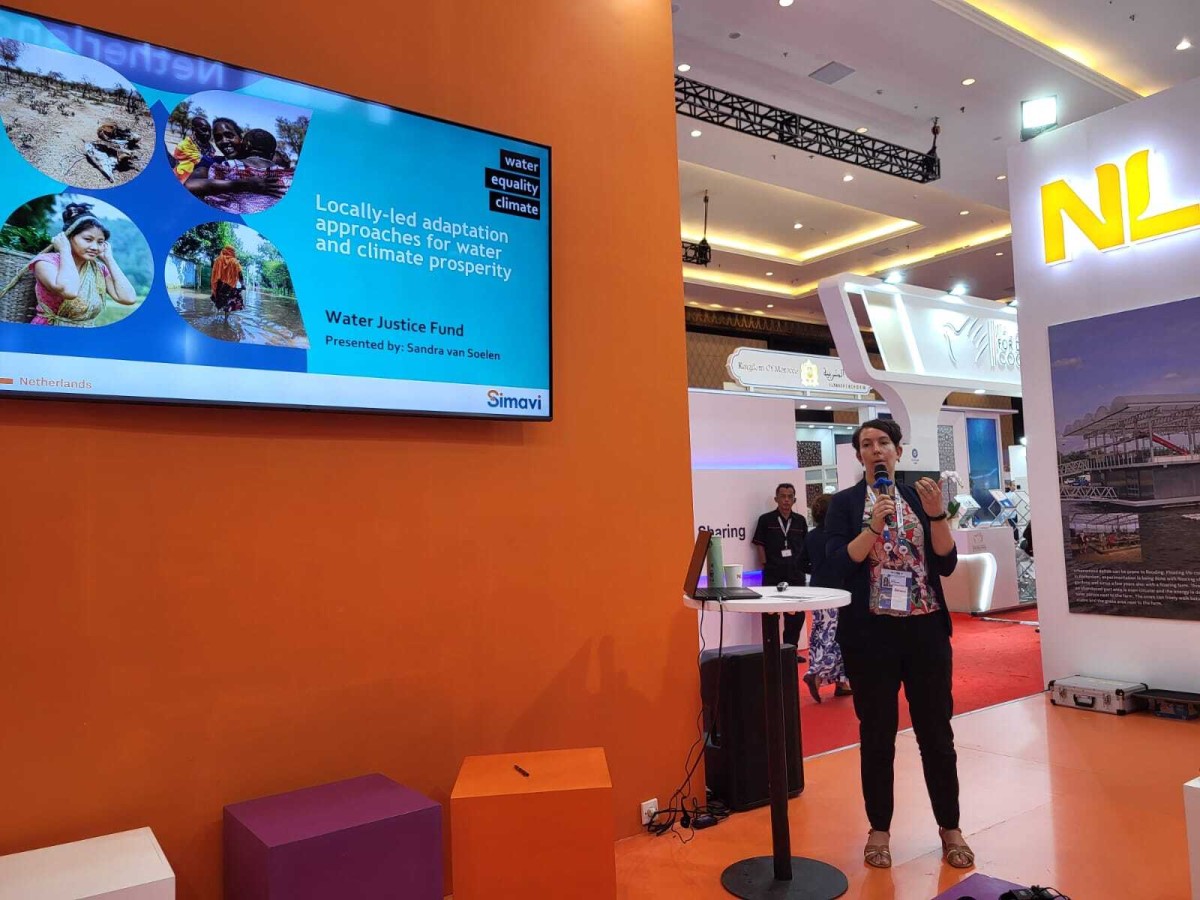Sandra van Soelen: 'Intimidation of water activists is unacceptable'
Sabotaging meetings, holding 40 activists hostage in their hotel for days, intimidating the UN Special Rapporteur: it was unprecedented what happened on the margins of the World Water Forum in Bali in late May. 'If the Indonesian government wanted to stifle critical voices, they achieved the opposite.'
Sandra van Soelen of Simavi went to the World Water Forum with a clear goal: on behalf of a network of organisations to ensure that the principle of 'Leaving no one behind' does not remain just fine words, but actually becomes part of policy and implementation around the world. The World Water Forum is a triennial conference where all kinds of players around water and sanitation such as governments, companies, donors and scientists come together to take new steps towards a world where everyone has access to water and sanitation.

Why is it necessary to draw attention to 'Leaving no one behind'?
'The World Water Forum is a platform to bring all stakeholders together, but unfortunately we see that in practice a large group of stakeholders is missing: for example, the hundreds of millions of women and girls who do not have access to clean drinking water and a safe toilet in their homes. This group is hit hardest by the decisions that are made, but their problems and solutions are not heard. It is too expensive or complicated for them to be represented.'
Water is a human right, how is it that so many still lack access to water and sanitation?
'Leaving no one behind' means also reaching those who are often invisible and have little influence: communities in remote areas, slum dwellers, and those who are rarely listened to: women and girls. This can be difficult and expensive for governments and water companies, but that doesn't make it any less important. The wry thing is that the price of water for households without a connection is often much higher: they pay by the jerry can or with their health.
What is the People's Water Forum and why was their work made impossible?
'The People's Water Forum is a kind of counter-movement of local organisations fighting for water justice. The World Water Forum is very business-oriented, also because there are many sponsors from that corner. For 20 years during the World Water Forum, the People's Water Forum has organised its own sessions with civil society organizations and local water activists for a few days.'
'This year, however, they were thwarted and intimidated in many ways from Day 1. Venues suddenly didn't want to cooperate with them, people from the local organisations were held hostage in their hotel for days without food. And when the United Nations Special Rapporteur on Water and Sanitation, Pedro Arrojo-Agudo, wanted to speak with them, he too was stopped.'
'I was then asked to put the Special Rapporteur in touch with the Dutch delegation at the World Water Forum to put pressure on the Indonesian authorities. Fortunately, I was able to quickly arrange a meeting with Meike van Ginneken, the Dutch Water Envoy and leader of the Dutch delegation in Indonesia.'
What did the Netherlands do next?
'Meike van Ginneken spoke with the Indonesian ministry concerned and also raised it during the sessions in which she was a speaker. The same thing was done from the Spanish and French delegations to give a clear signal to the Indonesian authorities. The next day, the people who had been taken hostage were released. If the Indonesian authorities wanted to stifle critical voices, they achieved the opposite.’
Is this kind of harassment of civil society organizations something you experience more often?
'Globally, there does seem to be a tendency for increasingly repressive action against activists and critics. The next World Water Forum will take place in Saudi Arabia and that does not reassure me. But we also see it in countries where Simavi works. Take Uganda, where it's very difficult to talk about LGBTIQ rights or the effects of an oil pipeline that the government wants. The effect is that people dare to speak out less and less.'
How should we deal with that from the Netherlands?
'I am glad that Meike van Ginneken spoke out in Bali about the importance of civic space. There will be a follow-up discussion with her about how we can engage in this even more in the future. Of course we as Simavi just keep doing our work, together with the women and girls concerned so they can continue to speak out about their needs and solutions. But it is also important that political leaders like Pedro Arrojo-Agudo and Meike van Ginneken continue to raise this at the international level. Because what happened in Bali is unacceptable.’


